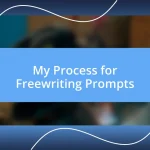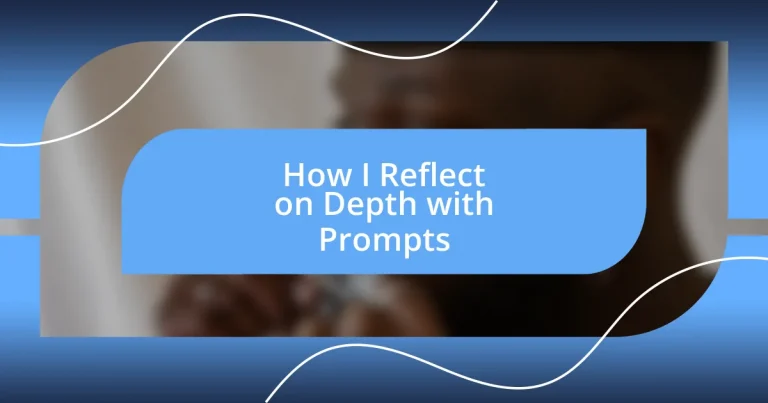Key takeaways:
- Reflective prompts enhance self-discovery and emotional clarity, facilitating personal growth and motivating change.
- Different types of prompts—open-ended, specific, and future-oriented—serve distinct purposes in encouraging deeper introspection and goal setting.
- Evaluating the reflection process regularly helps identify patterns, track growth, and apply insights effectively to enhance personal development.
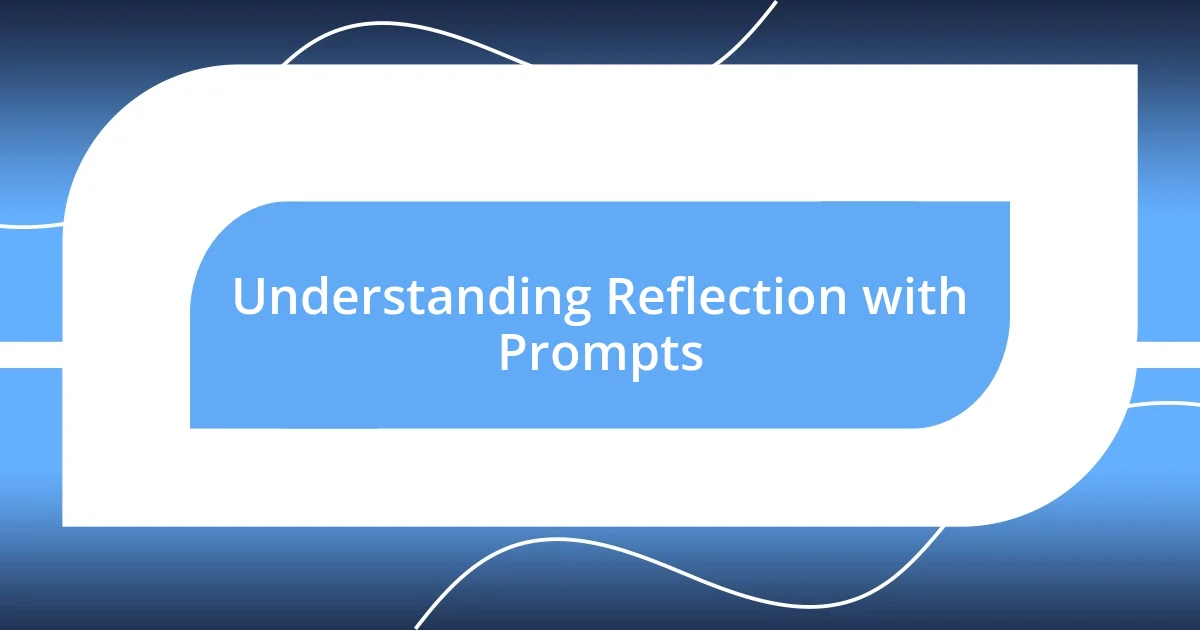
Understanding Reflection with Prompts
Reflection with prompts can be a transformative process. I remember the first time I encountered a reflective prompt during a workshop; it struck me how a simple question could unlock layers of my thoughts and emotions. Have you ever felt a moment of clarity flood over you when you reflected deeply on a specific inquiry? It’s like shining a light into the corners of your mind that often remain shadowed.
Using prompts fosters a dialogue with oneself that encourages genuine introspection. One evening, I jotted down a prompt about a recent challenge I faced. As I wrote, I felt a sense of relief wash over me, almost as if I was revisiting and understanding my experience anew. Does the act of putting pen to paper resonate with you as a tool for navigating complicated feelings?
These prompts serve not just as questions but as catalysts for growth. I find that the deeper I delve into the prompts, the more surprising insights I uncover about my motivations and fears. How often do we pause to examine our thoughts? It’s a question worth considering, as reflection leads to personal transformation, fostering self-awareness that can guide our future paths.
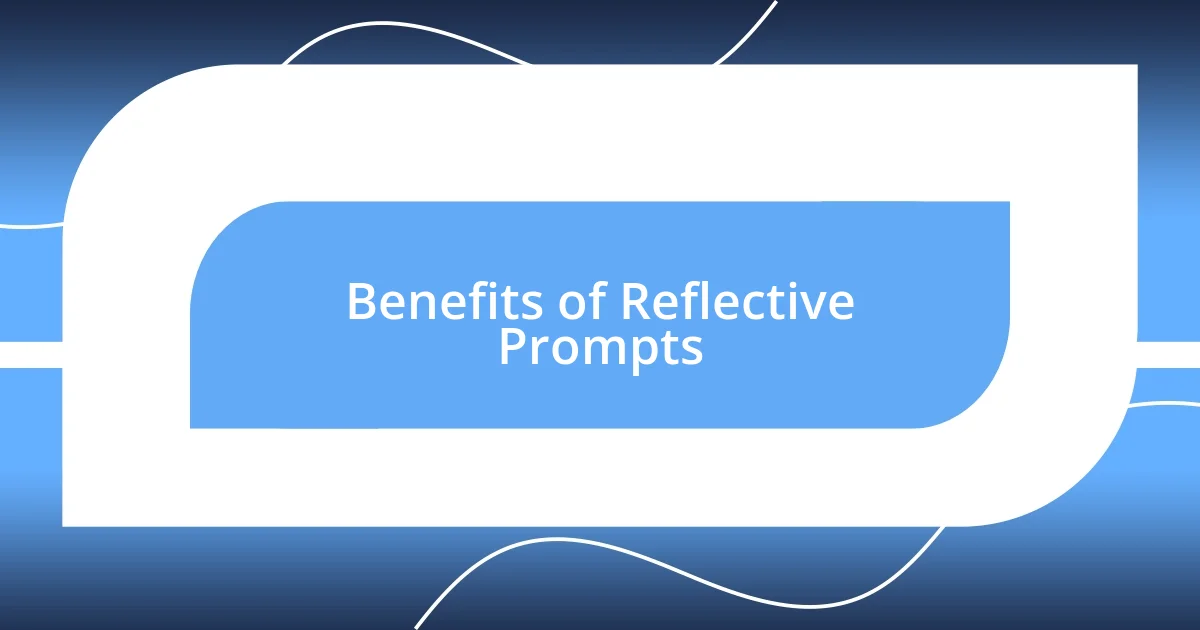
Benefits of Reflective Prompts
Reflective prompts offer an array of benefits that profoundly affect our personal growth and self-awareness. When I decided to engage with these prompts regularly, I noticed that each session felt like peeling an onion—layer by layer, I uncovered deeper emotions and thoughts. This process not only heightened my self-awareness but also allowed me to reconnect with parts of myself that I had overlooked for years. When we take the time to ponder and respond to these invitations, it’s like opening a door to a room full of hidden treasures within ourselves.
Here are some specific benefits I’ve experienced from using reflective prompts:
- Enhanced Self-Discovery: Each prompt pushes me to explore new aspects of my beliefs and values.
- Improved Emotional Clarity: I often find that reflecting on my feelings through prompts helps me navigate complex emotions more effectively.
- Motivation for Change: Many times, prompts have sparked a desire in me to make positive changes in my life.
- Stress Relief: The act of writing down my thoughts tends to ease my mind, providing a way to process anxieties.
- Goal Realignment: Reflecting encourages me to assess and realign my goals, ensuring they resonate with my evolving self.
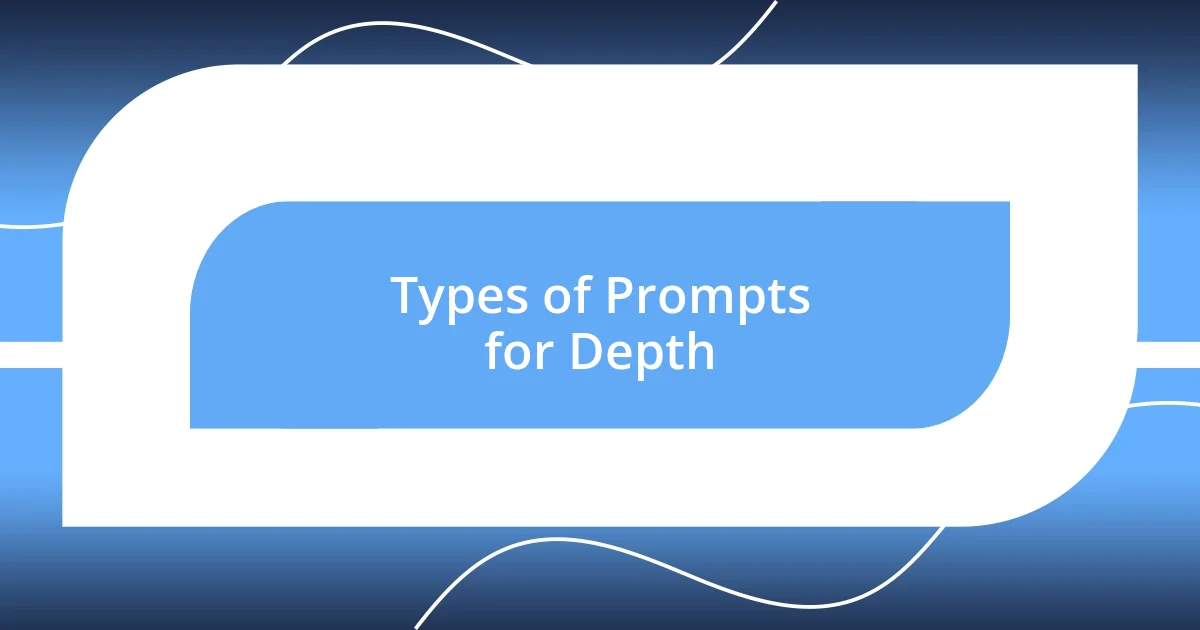
Types of Prompts for Depth
When diving into types of prompts for depth, I’ve found that they can generally be categorized into several distinct types, each serving different purposes in our reflective journey. For instance, open-ended prompts invite expansive thinking. I once encountered a prompt asking, “What defines my happiness?” This question opened a floodgate of thoughts and emotions, allowing me to explore not just surface-level ideas but to confront what truly fulfills me on a deeper level.
Conversely, specific prompts tend to focus on a defined experience, drawing attention to key moments in our lives. A specific prompt such as “Describe a time you faced failure” challenged me to confront my vulnerabilities. As I recounted that moment, I felt a mix of regret and gratitude, realizing how far I’ve come since then. It was grounding, reminding me that failures can be valuable teachers.
Finally, reflective prompts can also be future-oriented, encouraging us to envision what we want to achieve or change. I remember a prompt that asked, “What habits do I want to develop this year?” This simple question sparked a sense of hope and accountability, pushing me to define actionable steps that aligned with my goals. Such prompts guide us to cultivate a reflective practice that not only examines the past but also shapes the future.
| Type of Prompt | Description |
|---|---|
| Open-ended | Encourages expansive thinking and deeper exploration of emotions. |
| Specific | Focuses on defined experiences to draw out lessons learned. |
| Future-oriented | Guides envisioning personal goals and habits for growth. |
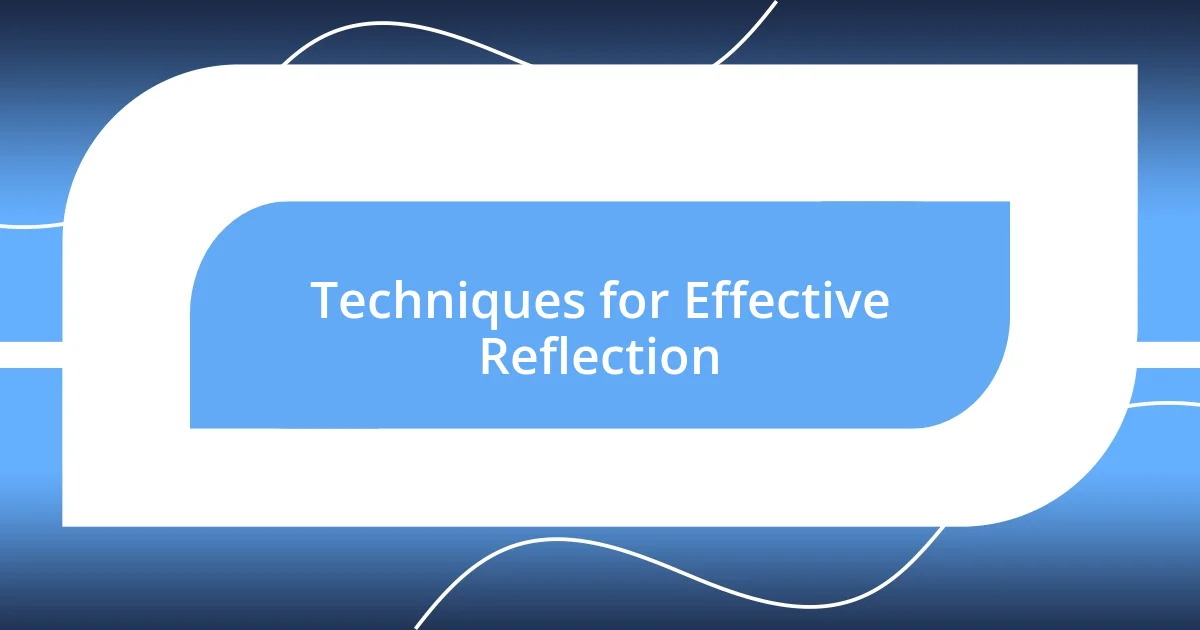
Techniques for Effective Reflection
To reflect effectively, I’ve often turned to journaling as a technique that really resonates with me. Writing down my thoughts creates an intimate dialogue between my current self and my deeper feelings, almost like having a conversation with a trusted friend. Have you ever found that when you write, the words flow in unexpected directions? It’s incredible how often I unearth insights I didn’t know I had, simply because I let my pen take the lead.
Another technique I use is mindfulness meditation combined with reflection. This approach has taught me to be present with my thoughts and feelings without judgment. I remember a session where I focused on a prompt about gratitude. As I sat quietly, allowing my mind to wander through the moments of the day, it struck me how even the mundane things sparked joy. This practice of slowing down not only calms my mind but also enriches my reflections with deeper emotional clarity.
Lastly, I love the idea of sharing reflections with a trusted buddy. I often catch myself thinking about how discussing my insights with someone can illuminate my blind spots. For instance, during one of these sessions, my friend pointed out a recurring theme in my reflections that I hadn’t noticed myself. That conversation opened my eyes to aspects of my experience I had overlooked, reinforcing the notion that we often need others to help shed light on our reflective journeys. Isn’t it amazing how collaboration can deepen our understanding of ourselves?
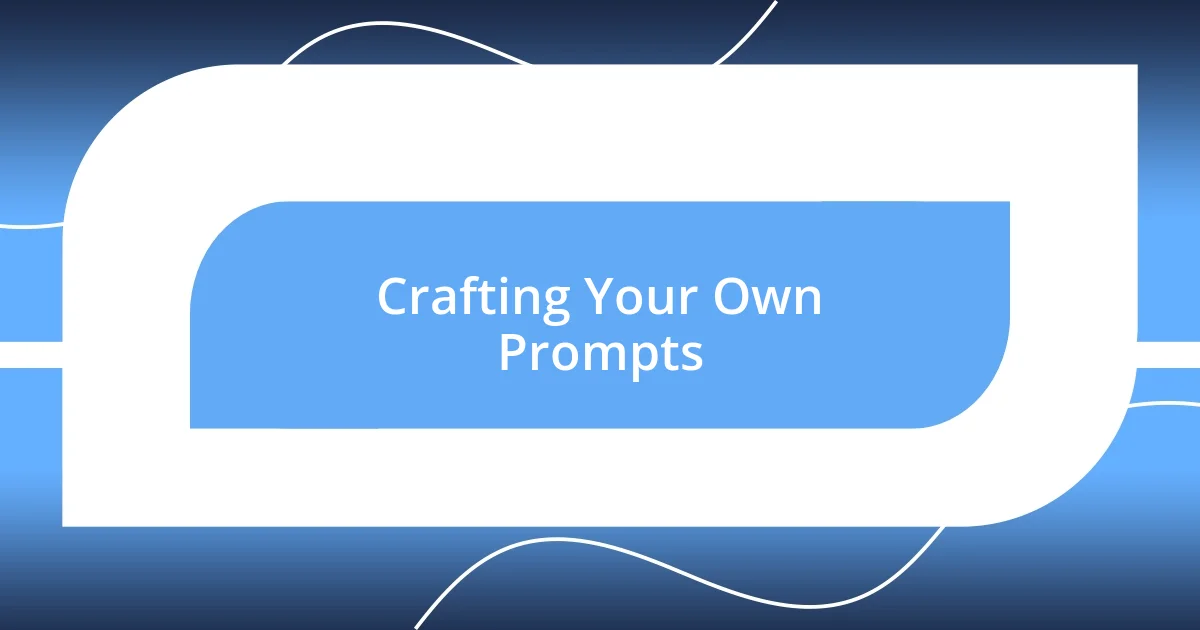
Crafting Your Own Prompts
Crafting your own prompts can be an enjoyable process that allows for personal reflection tailored to your thoughts and feelings. One evening, I decided to create a prompt that stemmed from my own struggles: “What beliefs do I hold that might be limiting my potential?” The moment I posed that question to myself, I felt a mix of discomfort and excitement, as I realized it was an opportunity to unpack deeply rooted thoughts that may have been holding me back.
When developing prompts, I like to blend introspective questions with elements from my daily life. For instance, after experiencing a particularly challenging week, I asked myself, “What did this week teach me about resilience?” Reflecting on that question led me to identify specific moments where I demonstrated strength, turning frustration into motivation. This kind of prompt can reveal patterns in your life and illuminate your personal growth.
Another effective approach is to play with the format of your prompts. I remember creating a visual prompt where I sketched a tree and labeled its branches with different life areas like relationships, career, and self-care. This encouraged a more creative exploration of my priorities. Would you believe that just by drawing, I uncovered what I cherished most? Sometimes, shifting the method can ignite fresh perspectives and deeper reflections, reminding me how exploration through creativity can often enrich understanding.
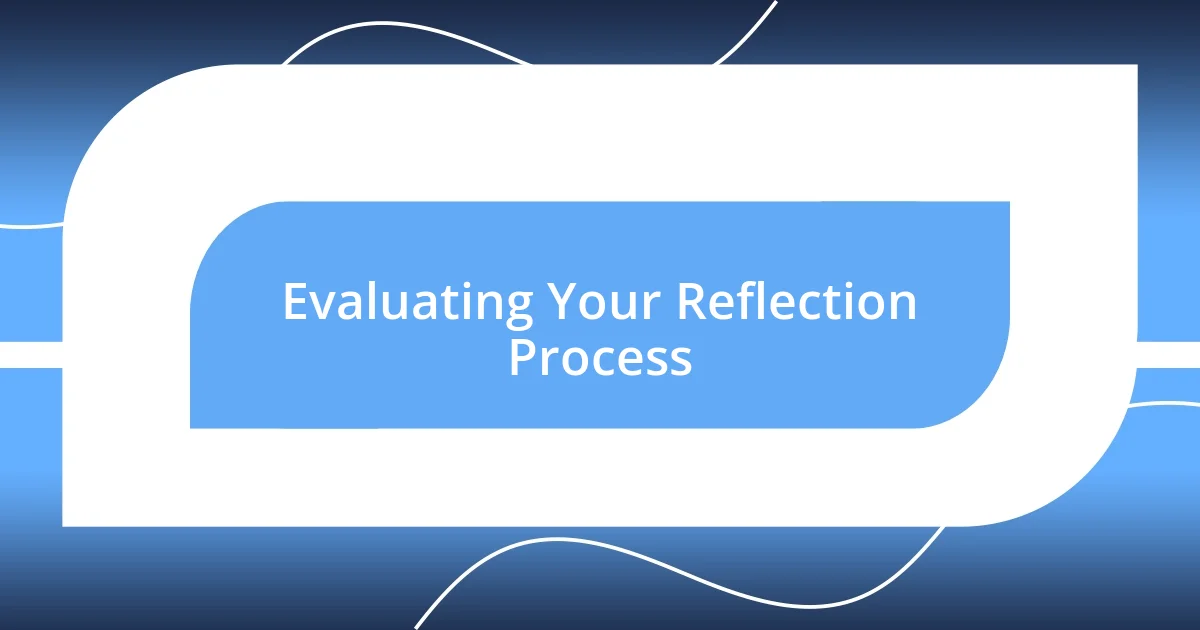
Evaluating Your Reflection Process
Evaluating my reflection process is something I view as an ongoing journey. One time, after a particularly intense period of introspection, I took a step back to analyze how I was processing my thoughts. I started asking myself questions like, “Are my reflections leading to actionable insights, or am I just cycling through the same thoughts?” This self-inquiry provided clarity, enabling me to identify patterns in my reflection habits and, ultimately, encouraging growth.
I often find that taking a break after my reflections allows me to return with fresh eyes. For instance, I remember writing extensively about a challenging relationship. After letting the writing sit for a few days, I went back to it and was amazed at how my emotional distance helped me see things from a wider perspective. It was a reminder that sometimes, space enhances clarity. Do you ever notice how time can shift your understanding of a situation?
Regularly checking in on my reflection goals is crucial. I’ll sit down every month to review my journal entries. This practice not only allows me to track my growth but also to question whether I’m still engaging with prompts that resonate. Are they stimulating my thoughts or have I settled into a routine? Evaluating these aspects nourishes my self-awareness and redefines my reflection process as a dynamic dialogue with myself.
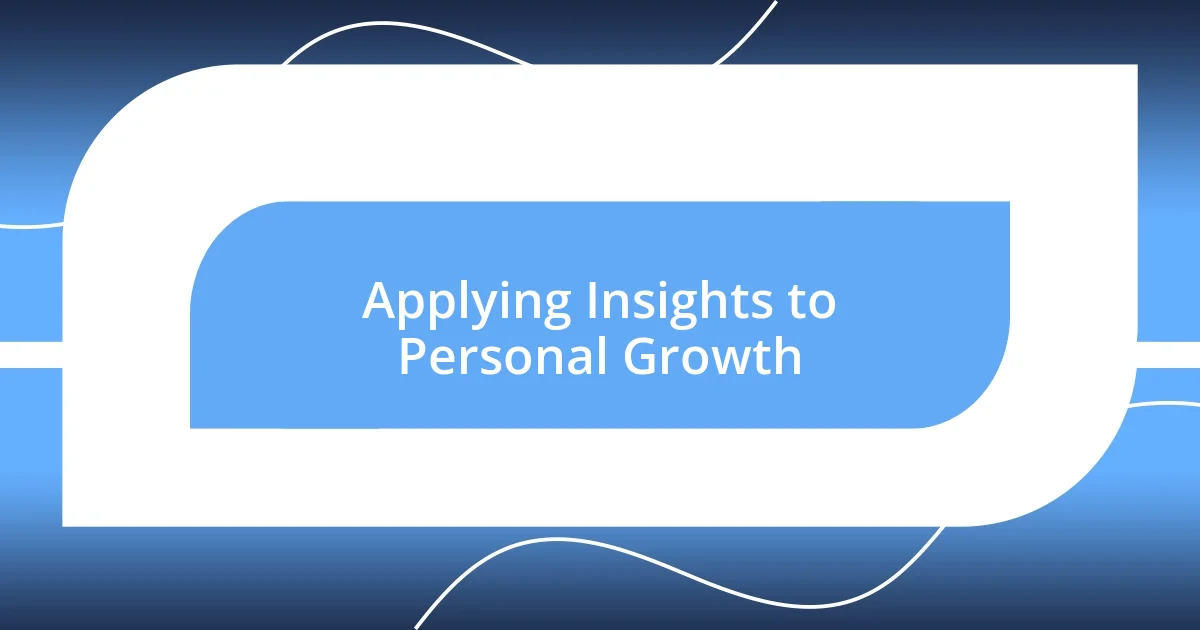
Applying Insights to Personal Growth
After crafting insightful prompts, I’ve learned to embrace the moments of clarity they bring. One evening, I was reflecting on the prompt, “What does success truly mean to me?” This question unraveled layers I hadn’t fully acknowledged. I remember feeling a stir of emotions as I recognized that my version of success wasn’t just about career achievements, but about meaningful connections and moments of joy. Have you ever felt a shift in your understanding of what really matters in your life? It’s transformative, isn’t it?
I often find that applying insights from my reflections nudges me toward action. For example, after contemplating my relationships, I identified a friend who consistently lifts me up. I decided to make it a point to express my gratitude more often, which deepened our connection. It’s funny how small, tangible actions can stem from deeper insights. When was the last time you acted on something you realized about yourself? Just a little shift can invigorate your interactions and enhance personal growth.
The commitment to applying these insights can become a powerful tool for transformation. I vividly recall a time when I had to confront my fear of public speaking. After reflecting on why it terrified me, I realized it was tied to a fear of judgment. So, I joined a local speaking group to challenge myself. Each session became a mini-exploration of courage, igniting my confidence in ways I never thought possible. How do you push through your fears? Taking that leap has shown me that the insights we gain aren’t just for understanding—they’re keys to unlocking our fullest potential.







